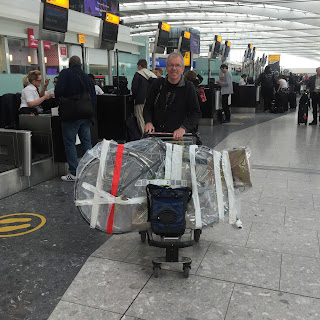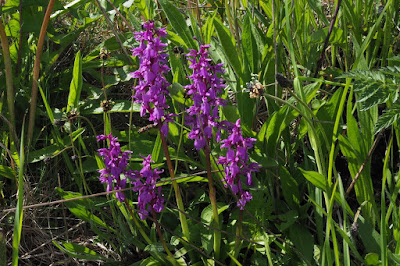After sampling the local beer the night before I felt I should visit the home of the brewery, Jever. It was a hot morning and the route wound though flat, green farmland crisscrossed by wide drainage ditches.
 |
| East Frisian landscape |
It was very like any flat, fenny landscape on the east coast of Britain, except for the German farmhouses. I guess their similarity to each other has something to do with them all being built on reclaimed land - it was the same in Denmark. I only needed to photograph one, because they all looked like this one, more or less.
Jever had plenty of shops and cafes -a pleasant small rural town. By the time I left it was very hot, and when I reached the coast again at Harleseil I realised it was too hot to cycle further. I didn't even have the energy to visit the dyke museum, but instead cycled a few kilometres along the coast to Neuharlingenseil where I put my tent up on another vast campsite and sat under my umbrella trying to stay cool.
I gave up on that quite fast and went into the village to buy ice cream. There was a statue of a fisherman leaning on the rails by the harbour and a steady stream of women stood beside him and put a hand on his bum. I went back to the campsite and found herring gulls in action raiding a neighbours tent. I recovered the debris of their plastic rubbish bag and chucked it away. Later, I went over to tell them about it and they invited me for beer. I told Gunther I'd enjoyed the Jever and he pulled a face, saying it was far too bitter, but he went out and bought me some! We had a entertaining chat with the help of my newly purchased German dictionary.
There was thunder and lightning during the night, but no rain, and no relief from the heat. The highlight of the following day's ride was stopping at a roadside orchard and buying a large punnet of cherries. They were cold and juicy and far more delicious than any ice cream but I only found them because I'd abandoned the dyke to cycle through the small town of Dornum. I camped at Norddeich (back to the dyke again) which has huge white hotels and sanatoria. It's the largest 'North Sea Spa' on the East Frisian coast and also a ferry port for the Frisian islands. It is BUSY! And the campsite is huge. The small shop was almost full with beer. There is a fine promenade from which you can look at the deckchairs and the mud.
 |
| Beer supplies |
 |
| Norddeich |
I was getting close now to the Dutch border. The next day took me to the town of Greetseil, which was a mediaeval port with a massive quantity of tourists, and then on to a much smaller campsite at Knock from where I could see the chimneys of the factories at Delfzijl across the Ems estuary in the Netherlands. There was also a swimming spot with proper deep water to swim in, so I did. In the morning I carried on along the dyke into Emden, where I was a little too late for Sunday morning breakfast at a cafe, and had to make do with cake. I bypassed Leer, using my umbrella to keep dry in a sudden thunderstorm, and by late afternoon I was cycling first beside the Ems, and then beside a railway track towards Bad Nieuwschans and the border.
 |
| Near Weener |
 |
| The Border |
This was the first time on the trip that I'd crossed a border by land. I was past the small footbridge over a stream before I realised what it was. The signs for the North Sea Cycle Route were three metres above me on a white post, and impossible to read without a telescope.
There was a 'Keltische Midzomer Festival' going on in the town and the campsite was full of people attending it. It was also full of slugs. The slugs were way more friendly than the heavy metal Kelts. They swarmed all over my tent and into the cooking things. They were brown and slimy.
Maps are here:
Neuharlingseil;
Norddeich;
Knock;
Bad Nieuweschens
Tips:
- The dyke is very long and it doesn't change much. There are a lot of interesting small towns just a few km inland from the coast. Unless you are wedded to the idea of following the route exactly it's much more interesting to divert inland.
- Beware of herring gulls. They are thieves and vandals.











Comments
Post a Comment